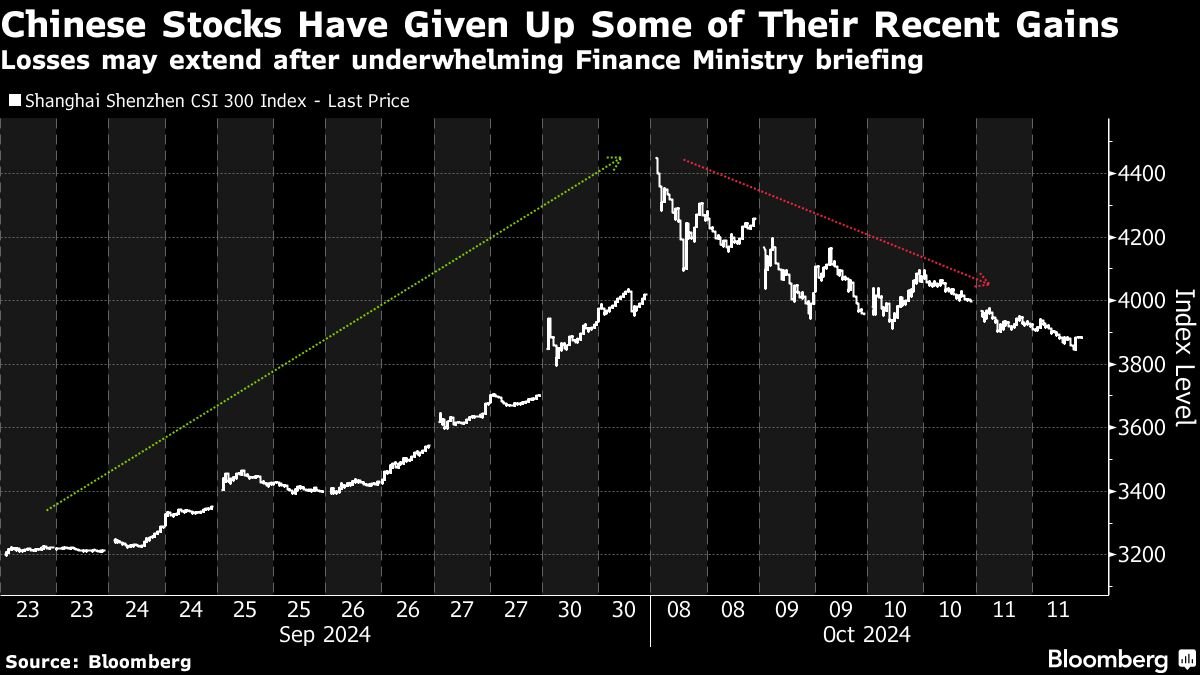(Bloomberg) — Financial markets got off to a cautious start to the week as China’s Finance Ministry briefing at the weekend underwhelmed and a drop in factory prices added to concerns over the nation’s economy.
Most Read from Bloomberg
Australian and New Zealand dollars slipped against the greenback in early trading on Monday, while China’s yuan also weakened. US stock futures were steady after the S&P 500 Index rose 0.6% on Friday. Australian shares edged higher. Elsewhere, oil slumped 1.7% and gold edged lower. Japanese markets were closed for a holiday on Monday, while Hong Kong trading will resume following a three-day weekend.
Investors will be monitoring Chinese markets after Finance Minister Lan Fo’an vowed more support for the struggling property sector and hinted at greater government borrowing, without producing a headline monetary figure that the markets had sought. Separately, data Sunday showed China’s consumer prices were still weak and that factory-gate prices fell for a 24th straight month, underscoring the need for more policy support.
“Markets are likely disappointed that China’s Finance Ministry did not unveil concrete additional stimulus,” Richard Franulovich, head of FX strategy at Westpac Banking Corp., wrote in a note to clients. “Though, a more conclusive market reading will come when China’s local markets open later Monday.”
Patience has been wearing thin among investors, who have been waiting for more fiscal measures to help sustain the rally sparked by the stimulus blitz that authorities unleashed in late September. The CSI 300 Index, a benchmark of onshore equities, capped its biggest weekly loss since late July on Friday, while the Aussie and Kiwi – proxies for China sentiment among developed market currencies – fell a second week for the first time in a month.
“With market participants looking to efficiently price certainty on China’s growth prospects, the lack of immediate clarity on China’s efforts to reflate the economy is unlikely to be taken well,” said Chris Weston, head of research at Pepperstone Group. “However, there was a message of strong intent and a defiant stance to hit its 5% GDP target, with a clear appetite for a sizable increase in the fiscal deficit and a potential move away from its 3% deficit limit – a factor that may limit any initial fallout in equity.”
In the US, the S&P 500 topped 5,800 on Friday, notching its 45th record in 2024 as big banks rallied after JPMorgan Chase & Co. announced a surprise increase in net interest income. Australian stock futures rose 0.6% on Friday while contracts for Chinese shares fell, moves that occurred prior to the MOF briefing.
The US dollar advanced in early trading on Monday after rising for a second week as traders pared expectations on the pace of Federal Reserve rate cuts. The Treasury curve steepened a second day Friday with yields on 2-year note closing little changed at 3.96% while that on 10-year bond rose 4bps to 4.1%. Cash Treasuries are closed in Asia due to the holiday in Japan.
“Whether the Fed decides to reduce rates at a faster or more gradual pace, the direction of travel remains unchanged, in our view,” Solita Marcelli, chief investment officer for the Americas at UBS Group AG’s wealth management unit wrote in a note. “We continue to recommend investors position for a lower-rate environment” by deploying cash into medium-duration investment grade bonds as well as quality stocks, she wrote.
This week, Chinese growth and retail sales data are due while inflation readings in New Zealand, Canada and the UK are expected. Thailand, Philippines and Indonesia central banks will give policy decisions ahead of the European Central Bank later this week.
“Clearly softer activity data and faster disinflation have had an immediate impact on both ECB communication and markets, which are now pricing a 95% probability of a 25bp cut this week,” Barclays strategists including Themistoklis Fiotakis wrote in a note to clients. “We view risks to European macro and interest rates as skewed to the downside, which creates scope for further euro weakness, particularly on crosses.”
Key events this week:
-
China trade balance, Monday
-
Singapore GDP, Monday
-
India CPI, Monday
-
UK unemployment rate and average weekly earnings, Tuesday
-
Eurozone industrial production, Tuesday
-
Canada CPI, Tuesday
-
Goldman Sachs, Bank of America, Citigroup earnings, Tuesday
-
Republican presidential candidate Donald Trump will be interviewed by Bloomberg editor-in-chief John Micklethwait at the Economic Club of Chicago, Tuesday
-
New Zealand CPI, Wednesday
-
Thailand, Philippines and Indonesia central bank interest-rate decisions, Wednesday
-
UK CPI, PPI, RPI and house price index, Wednesday
-
ASML, Morgan Stanley earnings, Wednesday
-
Australia unemployment, Thursday
-
Eurozone CPI, ECB rate decision, Thursday
-
US retail sales, jobless claims, industrial production, business inventories, Thursday
-
TSMC, Netflix earnings, Thursday
-
Japan CPI, Friday
-
China GDP, retail sales, industrial production, home prices, Friday
-
UK retail sales, Friday
Some of the main moves in markets:
Stocks
-
S&P 500 futures were little changed as of 8:22 a.m. Tokyo time
-
Hang Seng futures were unchanged
-
Australia’s S&P/ASX 200 rose 0.3%
Currencies
-
The Bloomberg Dollar Spot Index rose 0.1%
-
The euro was little changed at $1.0927
-
The Japanese yen was little changed at 149.25 per dollar
-
The offshore yuan fell 0.2% to 7.0874 per dollar
-
The Australian dollar fell 0.3% to $0.6732
Cryptocurrencies
-
Bitcoin fell 0.1% to $62,679.3
-
Ether rose 0.2% to $2,463.79
Bonds
Commodities
-
West Texas Intermediate crude fell 1.9% to $74.15 a barrel
-
Spot gold fell 0.3% to $2,648.90 an ounce
This story was produced with the assistance of Bloomberg Automation.
Most Read from Bloomberg Businessweek
©2024 Bloomberg L.P.
Source link
